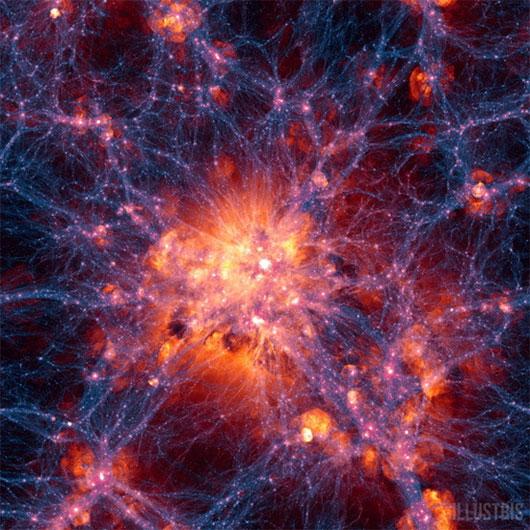Decipher the mystery of dark matter
British scientists believe that a completely new type of elementary particle can explain the mystery of "dark matter" , which is believed to occupy most of the universe's mass.
What is dark matter?
In astrophysics, the term dark matter refers to a hypothetical material in the universe, whose components are not yet understood. Dark matter does not emit or reflect enough electromagnetic radiation to be observed with telescopes or current measuring devices, but it can be received because of its gravitational effects on the substance. snakes and / or other objects as well as the whole universe. Based on the current understanding of structures larger than galaxies, as well as widely accepted theories about the Big Bang, scientists think dark matter is the basic component that accounts for 70% of matter. (dark matter + ordinary matter) in the universe.
Scientists say dark matter accounts for 26.8% of the total energy - the combined mass of the universe, while ordinary matter only accounts for 4.9%. In terms of mass, dark matter is thought to account for 84.5% of the universe.
For astronomers, dark matter reveals their traces through how their gravitational forces affect stars and galaxies, helping them connect them and establish the structure of the universe. . Traces of dark matter are also visible in the cosmic microwave background (CMB) , which remains after the Big Bang.

However, despite countless research efforts, no one has ever observed dark matter directly.
Researchers at the University of Southampton (UK) have proposed the hypothesis of a completely new type of elementary particle for dark matter. They believe that the nature of this hypothetical particle may be why no one has ever been able to directly detect this mysterious material.
The new hypothetical particle has only about 0.02% mass of an electron. Although it does not interact with light, it does amazingly interact with ordinary matter and cannot even penetrate the Earth's atmosphere.
If these estimates are correct, dark matter particles are less likely to be detected by detectors on Earth.
"Our research brings together various areas of physics: particle theoretical physics, X-ray astronomy and experimental quantum optics. The particle we propose sounds crazy, but there does not seem to be any test or observation that can disprove it, dark matter is one of the most important, unresolved issues in modern physics and we hope our proposal will inspiring other scientists to develop particle theory for setting and even experimental tests, " said Dr. James Bateman, a member of the University of Southampton research team.
Mr. Bateman and colleagues hope to combine a new hypothetical particle study into a related space experiment.
The project of Quantum Resonance Resonance Devices (Maqro) will be promoted to examine quantum phenomena, ie strange behavior of subatomic particles, at a larger scale. In this test, a nanoparticle suspended in space will be used to see if its position is altered by the flow of dark matter.
- The mystery of dark matter has been decoded?
- 11 mysteries about dark matter have not been answered yet
- New explanation of the origin of dark matter
- The mystery of dark energy
- Found signs of dark matter
- Revealing the first image of dark matter
- The race to find dark matter is heating up
- Earth is losing dark matter
- How will a large particle accelerator decipher the mystery of the universe?
- Telescope glass researches dark matter
- The first image of the dark matter network, which connects galaxies together
- Detecting dark matter fibers
 Van Allen's belt and evidence that the Apollo 11 mission to the Moon was myth
Van Allen's belt and evidence that the Apollo 11 mission to the Moon was myth The levels of civilization in the universe (Kardashev scale)
The levels of civilization in the universe (Kardashev scale) Today Mars, the sun and the Earth are aligned
Today Mars, the sun and the Earth are aligned The Amazon owner announced a secret plan to build a space base for thousands of people
The Amazon owner announced a secret plan to build a space base for thousands of people